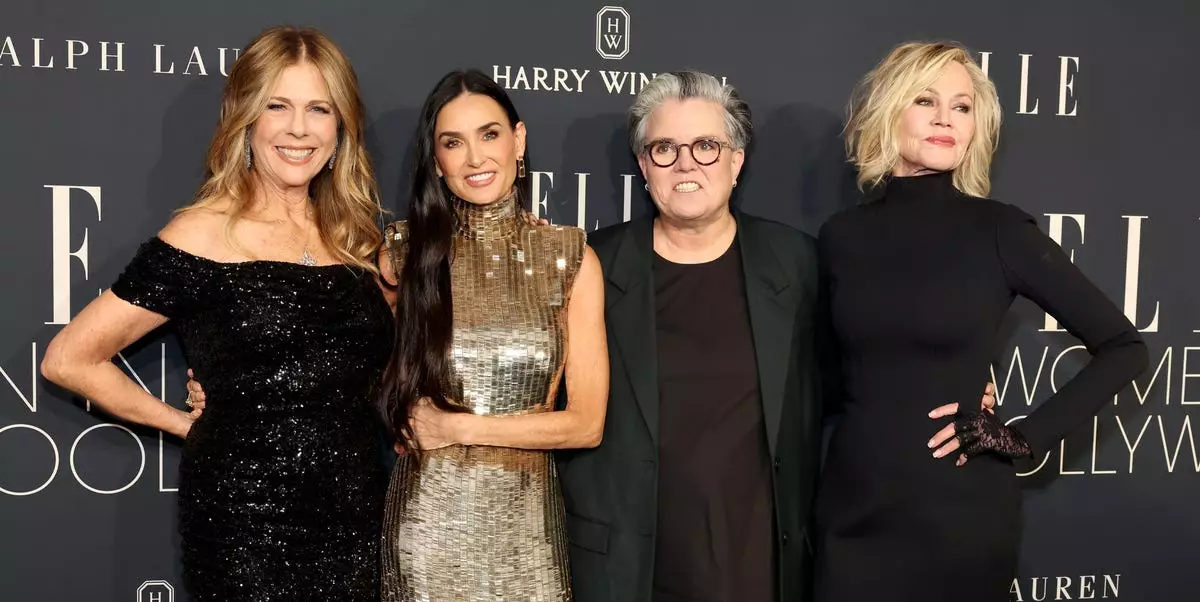Last night, the glimmering lights of Hollywood came alive at ELLE’s Women in Hollywood event. The gathering underscored the achievements of inspiring women in the industry, featuring a star-studded lineup that included Melanie Griffith, Rita Wilson, and Rosie O’Donnell. A sense of nostalgia and celebration permeated the atmosphere as the trio came together to honor Demi Moore, their co-star from the iconic film “Now and Then.” This event wasn’t just an occasion to reminisce but a reflection of the progress women have made in cinema since the film’s debut nearly three decades ago.
During the event, Griffith poignantly remarked on their shared history with Moore, recalling the film as a groundbreaking venture produced and led by women. The significance of “Now and Then” lies in its portrayal of female friendships and complex narratives, a rarity in a male-dominated Hollywood of the 1990s. O’Donnell further emphasized this point, highlighting how “Now and Then” was a narrative about women, made by women—a commendable feat during an era when female-driven stories were few and far between.
Reflecting on Moore’s influence, Wilson noted her audacious decision to appear naked and pregnant on a Vanity Fair cover, a move that broke societal norms and redefined celebrity. The fact that public perception has shifted to now accommodate even less coverage illustrates how Moore’s courage set a standard for contemporary celebrities who often embrace boldness on the red carpet, albeit in different forms.
As the three actresses reminisced about their time together, it sparked a discussion about the clunky stereotypes that have historically confined women in Hollywood. Griffith cleverly referenced Goldie Hawn’s humorous depiction of women’s roles in mainstream film—limited to archetypes like the “babe” or the “district attorney.” Unlike many of her contemporaries, Moore carved a niche for herself by portraying layered characters in films such as “Ghost,” “A Few Good Men,” “Indecent Proposal,” and “Disclosure.” Moore’s ability to balance her acting with producing roles in notable films highlights her multifaceted talent and the barriers she has broken in the industry.
This tribute also marks a cultural moment where we witness a resurgence of interest in Moore’s work—her career experiencing what the actresses referred to as a “Demi-ssance.” This resurgence speaks volumes about the cyclical nature of the film industry and how it is beginning to embrace narratives that honor the contributions of women.
The camaraderie displayed by Griffith, Wilson, O’Donnell, and Moore at the event reminds us of the lasting impact that “Now and Then” has had on their lives and careers. The film not only served as a launching pad for exploration of friendship and nostalgia but also reinforced the value of authentic female relationships. Their reunion was a powerful testament to the bonds forged during their time together on set.
Such gatherings also illuminate the importance of continued support for women’s contributions to cinema. With initiatives like the Women’s Cancer Research Fund and other philanthropic efforts, the actresses are actively engaged in advocating for women’s rights and health, showcasing their dedication to making positive changes.
As we reflect on the celebration at ELLE’s Women in Hollywood event, we recognize that the narratives portrayed in “Now and Then” are just as relevant today. The film encapsulates a spirit of resilience and camaraderie among women, reinforcing the message that female voices and stories have their rightful place in Hollywood. The strides made by Demi Moore, Melanie Griffith, Rosie O’Donnell, and Rita Wilson are not merely personal accomplishments; they symbolize a collective move towards greater representation and respect for women in the film industry.
As we revisit the legacy of “Now and Then” and celebrate the achievements of women like Moore, it’s essential to carry forward this momentum. In championing diversity and inclusivity, we create a path for future generations of women in Hollywood to thrive and tell their stories—unlimited by the constraints of past norms.

